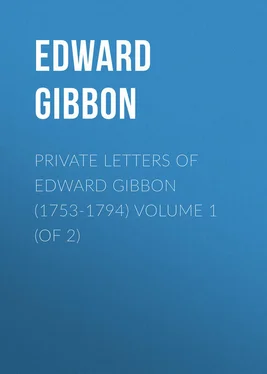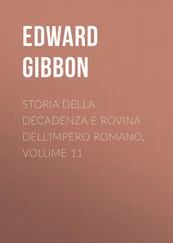Edward Gibbon - Private Letters of Edward Gibbon (1753-1794) Volume 1 (of 2)
Здесь есть возможность читать онлайн «Edward Gibbon - Private Letters of Edward Gibbon (1753-1794) Volume 1 (of 2)» — ознакомительный отрывок электронной книги совершенно бесплатно, а после прочтения отрывка купить полную версию. В некоторых случаях можно слушать аудио, скачать через торрент в формате fb2 и присутствует краткое содержание. Жанр: foreign_antique, foreign_prose, на английском языке. Описание произведения, (предисловие) а так же отзывы посетителей доступны на портале библиотеки ЛибКат.
- Название:Private Letters of Edward Gibbon (1753-1794) Volume 1 (of 2)
- Автор:
- Жанр:
- Год:неизвестен
- ISBN:нет данных
- Рейтинг книги:3 / 5. Голосов: 1
-
Избранное:Добавить в избранное
- Отзывы:
-
Ваша оценка:
- 60
- 1
- 2
- 3
- 4
- 5
Private Letters of Edward Gibbon (1753-1794) Volume 1 (of 2): краткое содержание, описание и аннотация
Предлагаем к чтению аннотацию, описание, краткое содержание или предисловие (зависит от того, что написал сам автор книги «Private Letters of Edward Gibbon (1753-1794) Volume 1 (of 2)»). Если вы не нашли необходимую информацию о книге — напишите в комментариях, мы постараемся отыскать её.
Private Letters of Edward Gibbon (1753-1794) Volume 1 (of 2) — читать онлайн ознакомительный отрывок
Ниже представлен текст книги, разбитый по страницам. Система сохранения места последней прочитанной страницы, позволяет с удобством читать онлайн бесплатно книгу «Private Letters of Edward Gibbon (1753-1794) Volume 1 (of 2)», без необходимости каждый раз заново искать на чём Вы остановились. Поставьте закладку, и сможете в любой момент перейти на страницу, на которой закончили чтение.
Интервал:
Закладка:
"Tôt ou tard il faut aimer,
C'est en vain qu'on façonne;
Tout fléchit sous l'amour
Il n'exempte personne,
Car Gib. a succombé en ce jour
Aux attraits d'une beauté
Qui parmi les douceurs d'un tranquil silence
Reposait sur un fauteuil," etc., etc.
They became engaged, and Gibbon implored her to marry him without waiting for the sanction of his father. This, however, she refused to do. When Gibbon left Lausanne in 1758, she wrote to him once; then all correspondence between them seems to have ceased, though Gibbon says that he wrote to her twice on his journey and once on his return to England. He also sent her his Essai with a dedicatory letter in 1761. In August, 1762, he wrote to break off the engagement, on the ground of his father's opposition, in a letter quoted by M. d'Haussonville ( Le Salon de Madame Necker , pp. 57, 58). In 1763 Gibbon came to Lausanne, and there received from Mademoiselle Curchod a letter in reply, which showed, so far as words could prove anything, that she had never ceased to love him. Her friend, the Pastor Moultou, endeavoured to interest J. J. Rousseau in the story, and to make him speak to Gibbon on the subject. But Rousseau declined to interfere, saying that Gibbon was too cold-blooded a young man for his taste or for Mademoiselle Curchod's happiness. In Gibbon's unpublished diary, he thus comments on the receipt of this letter, September 22, 1763: "J'ai reçu une lettre des moins attendûes. C'etoit de Mademoiselle C. Fille dangereux et artificielle! Elle fait une apologie de sa conduite depuis le premier moment, qu'elle m'a connû, sa constance pour moi, son mepris pour M. de Montplaisir, et la fidelité delicate et soutenue qu'elle a cru voir dans la lettre où je lui annoncois qu'il n'y avoit plus d'espérance. Ses voyages à Lausanne, les adorateurs qu'elle y a eû, et la complaisance avec laquelle elle les a ecouté formoient l'article le plus difficile à justifier. Ni d'Eyverdun (dit elle), ni personne n'ont effacé pendant un instant mon image de son cœur. Elle s'amusoit à Lausanne sans y attacher. Je le veux. Mais ces amusements la convainquent toujours de la dissimulation la plus odieuse, et, si l'infidelité est quelquefois une foiblesse, la duplicité est toujours un vice. Cette affaire singulière dans toutes ses parties m'a été très utile; elle m'a ouvert les yeux sur le caractère des femmes, et elle me servira longtemps de preservatif contre les seductions de l'amour." Mademoiselle Curchod came to Lausanne in February, 1764, and again met Gibbon; "Elle me badine sur mon ton de petit maître. Elle a du voir cent fois que tout étoit fini sans retour." "Nous badinons," he says again in the same month, "trés librement sur nôtre tendresse passée, et je lui fais comprendre tout clairement que je suis an fait de son inconstance." Gibbon's continued coldness at length convinced Mademoiselle Curchod that his affection for her was entirely extinguished, and she took her leave of him in an indignant letter, quoted by M. d'Haussonville, as she undoubtedly thought, for ever. In this farewell letter she repudiates the suggestion of her inconstancy: "Si l'on vous a dit que j'aie écouté un seul moment M. d'Eyverdun, j'ai ses lettres, vous connoissez sa main, un coup d'œil suffit pour me justifier." Mademoiselle Curchod married, at the end of 1764, Jacques Necker, and became the mother of Madame de Stäel-Holstein.
Footnote_55_55
At Monrepos in 1757-58, when Voltaire was living at les Délices , Gibbon had heard him in his tragedies of Zaïre , Alzire , Zulime , and his sentimental comedy L'Enfant Prodigue . Voltaire settled at Ferney in 1758.
Footnote_56_56
Charles Paulet, fifth Duke of Bolton, who committed suicide in 1765, was succeeded in the Lord Lieutenancy of Hampshire by James Brydges, Marquess of Carnarvon. Lord Carnarvon resigned the post in 1764, because Mr. Stanley was appointed Governor of the Isle of Wight ( Grenville Correspondence , vol. ii. pp. 399-403).
Footnote_57_57
Name illegible. Probably Lord Northington.
Footnote_58_58
Sir Thomas Worsley, Bart.
Footnote_59_59
On April 7, 1763, Lord Bute resigned, and was on the same day succeeded by George Grenville, as First Lord of the Treasury. During the autumn recess, George III. opened negotiations with Pitt to take Grenville's place. But no change was made, and Grenville was preparing to meet Parliament in November, 1763, as Prime Minister.
Footnote_60_60
Henry Temple, second Viscount Palmerston (1739-1802), a man of artistic tastes, and, in after-years, a frequent resident in Italy. He was at this time M.P. for Hastings. He married, as his second wife, January 3, 1783, Miss Mee, by whom he was the father of the Prime Minister, born 1784.
Footnote_61_61
In Gibbon's Journal for September 23, 1762, written at Southampton, occurs the following entry which explains the words "my friend Wilkes: " – "Colonel Wilkes of the Buckinghamshire Militia dined with us, and renewed the acquaintance Sir Thomas and myself had begun with him at Reading. I scarce ever met with a better companion; he has inexhaustible spirits, infinite wit and humour, and a great deal of knowledge: but a thorough profligate as well in principle as in practice; his character is infamous, his life stained with every vice, and his conversation full of blasphemy and bawdy. These morals he glories in, for shame is a weakness he has long since surmounted. He told us himself that, in this time of public dissension, he was resolved to make his fortune. Upon this noble principle he has connected himself with Lord Temple and Mr. Pitt, commenced a public adversary to Lord Bute whom he abuses weekly in the North Briton , and other political papers in which he is concerned. This proved a very debauched day; we drank a good deal both after dinner and supper, and when at last Wilkes was retired, Sir Thomas and some others (of whom I was not one) broke into his room and made him drink a bottle of claret in bed." Wilkes had been challenged by Mr. Samuel Martin, M.P. for Camelford, formerly Secretary of the Treasury under both the Duke of Newcastle and Lord Bute, for speaking of him in the North Briton as a low fellow and dirty tool of power. Wilkes was dangerously wounded in the duel, which was fought in November, 1763. In the preceding April he had been arrested under a General Warrant on suspicion of being the author of No. 45 of the North Briton . He applied for a writ of Habeas Corpus, and the case came before Lord Chief Justice Pratt in the Court of Common Pleas. He was discharged from custody, the judges unanimously holding that the arrest was a breach of his privilege as a member of Parliament.
Footnote_62_62
Gibbon refers to his promotion to the rank of major in the Hampshire Militia.
Footnote_63_63
Lady Mary died in 1761. A surreptitious edition, said to be edited by John Cleland, of her letters written during her travels in Europe, Asia, and Africa, was published in three volumes at London in 1763.
Footnote_64_64
George Pitt, first Lord Rivers (cr. 1776), served as Envoy at the Court of Turin from 1761 to 1768, in which latter year he was elected M.P. for Dorsetshire. He died in 1803, at the age of eighty-two.
Footnote_65_65
Edward Augustus, Duke of York, third child and second son of Frederick, Prince of Wales, born March 14, 1739, died September 17, 1767, at Monaco.
Footnote_66_66
Интервал:
Закладка:
Похожие книги на «Private Letters of Edward Gibbon (1753-1794) Volume 1 (of 2)»
Представляем Вашему вниманию похожие книги на «Private Letters of Edward Gibbon (1753-1794) Volume 1 (of 2)» списком для выбора. Мы отобрали схожую по названию и смыслу литературу в надежде предоставить читателям больше вариантов отыскать новые, интересные, ещё непрочитанные произведения.
Обсуждение, отзывы о книге «Private Letters of Edward Gibbon (1753-1794) Volume 1 (of 2)» и просто собственные мнения читателей. Оставьте ваши комментарии, напишите, что Вы думаете о произведении, его смысле или главных героях. Укажите что конкретно понравилось, а что нет, и почему Вы так считаете.












